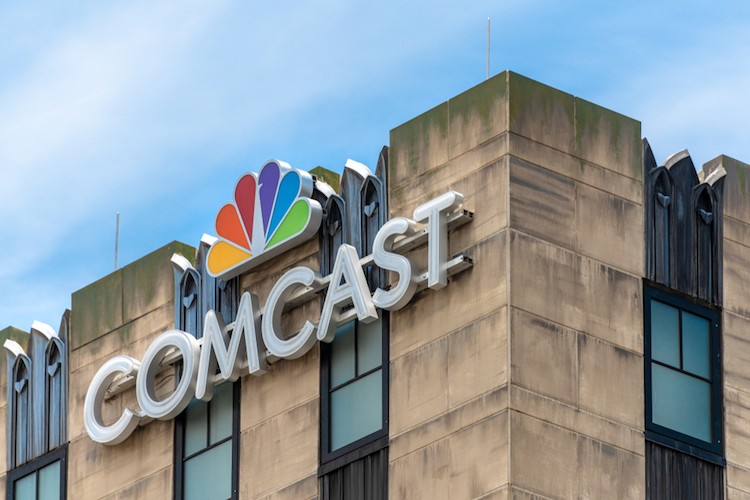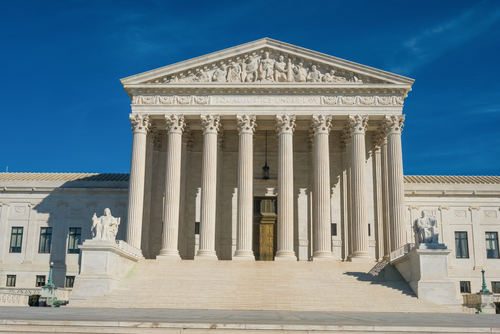Can black TV mogul's discrimination suit against Comcast proceed? SCOTUS to decide

Image from Shutterstock.com.
People of a certain age will remember Byron Allen as one of the earliest stars of reality TV. He was a host of Real People, an NBC show that ran for five years beginning in 1979 and featured lighthearted profiles of those with unusual jobs or oddball characteristics.
If the show was around today and Allen himself were a subject, a host might introduce him this way: “He was a standup comic in his early teens and made his first appearance on Johnny Carson at age 18. After years as a TV host, he turned entrepreneur and launched a successful independent film and TV studio and is a self-described billionaire.”
Allen, 58, is the founder, chairman, and chief executive officer of closely held Entertainment Studios Networks, a Los Angeles-based independent operator of such digital and cable channels as JusticeCentral.TV, Pets.TV, Comedy.TV and Cars.TV.
Allen and his company are engaged in a high-stakes U.S. Supreme Court battle against Comcast Corp., one of the nation’s largest cable TV providers, over alleged race discrimination in contracting. He alleges in a $20 billion lawsuit that Comcast was motivated by racial bias in refusing to pick up his channels for inclusion on its cable systems in recent years. Comcast denies the charges, saying it had legitimate business reasons for its decisions.
On Nov. 13, in Comcast Corp. v. National Association of African American-Owned Media, the high court will consider a key threshold question stemming from the suit: whether a race-discrimination claim under the Civil Rights Act of 1866 may proceed in the absence of “but-for causation,” meaning the action would not have been taken but for the alleged racial discrimination.
The Reconstruction-era statute, known today as Section 1981, requires “all persons within the jurisdiction of the United States” to have the same right to make and enforce contracts “as is enjoyed by white citizens.”
“This is America’s original civil rights statute,” Allen, an African American, says of Section 1981 in an interview with the ABA Journal. “It was put on the books to pave an economic pathway for former slaves.”
 Byron Allen in 2012. Photo from Shutterstock.com.
Byron Allen in 2012. Photo from Shutterstock.com.
Seeking Spots on the Channel Lineup
Beginning in 2008, Entertainment Studios sought a deal with Comcast to have the large cable company begin carrying its channels. For seven years, Allen alleges, Comcast offered shifting stories. It told the upstart programmer it should seek support for carriage on its systems from Comcast’s regional or divisional offices and management teams. When Entertainment Studios met such objectives, Comcast said it lacked the bandwidth to carry the channels, Allen alleges.
“Byron was told for years, ‘Do this, do that, and we’ll carry your channels.’ He did that at great expense,” says Erwin Chemerinsky, the dean of the law school at the University of California at Berkeley, who will argue before the justices on behalf of Allen’s company. Chemerinsky is also a contributing columnist for the ABA Journal. One potentially damaging allegation included in Allen’s original lawsuit says a Comcast executive told Entertainment Studios, “We’re not trying to create anymore Bob Johnsons.”
That was a reference to Robert L. Johnson, the African American co-founder of Black Entertainment Television, which grew into a media empire that Johnson sold to Viacom for $3 billion in 2001. (The allegation was “inadvertently” dropped from a later version of the suit, the Entertainment Studios’ brief says.)
In 2015, Allen’s company sued Comcast under Section 1981. Entertainment Studios, along with an entity founded by Allen called the National Association of African American-Owned Media, also named as defendants the NAACP, activist Al Sharpton and other parties, alleging a conspiracy between them and several cable distributors to disadvantage black-owned media such as Allen’s company. But the conspiracy allegations were dropped in later versions of the suit. Entertainment Studios separately sued another cable operator that had declined to carry its channels: Charter Communications.
A federal district court granted Comcast’s motion to dismiss the suit, holding that the defendant may have had legitimate business reasons for denying carriage of Allen’s channels.
A panel of the 9th Circuit U.S. Court of Appeals heard appeals in both the suits, and it applied to Comcast a decision it made in the Charter case, that if “discriminatory intent plays any role in a defendant’s decision not to contract with a plaintiff, … then that plaintiff has not enjoyed the same right as a white citizen.” The court thus concluded that a plaintiff may prevail “even if racial animus was not the but-for cause of a defendant’s refusal to contract.”
Lacking ‘Sufficient Commercial Promise’
Comcast, in its brief, points out that Entertainment Studios sued several cable operators after they had announced a major merger, “in an apparent effort to leverage the need for regulatory approval to secure carriage for [Entertainment Studios’] networks.”
“And plaintiffs did not stop there,” the Comcast brief continues. “Rather, they alleged a vast conspiracy among video programming distributors, governmental agencies and prominent civil-rights figures to systematically exclude ‘truly African American–owned media.’ ”
Comcast decided not to carry Allen’s channels because it determined they “did not show sufficient commercial promise.”
Miguel A. Estrada, a Gibson, Dunn & Crutcher partner representing Comcast, says in an interview that “if you just apply man-on-the-street common sense to [Allen’s] lawsuit, you would think that in a world where, sadly, there is still racial discrimination, this is not the type of case that should be caught up in our courts.”
Comcast has allies such as the U.S. Chamber of Commerce and President Donald Trump’s administration, who argue that Section 1981 incorporates a “default rule” of but-for causation.
“Because Section 1981 does not authorize a shift in the burden of persuasion, a plaintiff must plead and prove all elements of her claim, including but-for causation,” U.S. Solicitor General Noel J. Francisco says in an amicus brief supporting Comcast.
Chemerinsky, citing the alleged runaround Allen received from Comcast and the alleged “Bob Johnsons” comment by a Comcast executive says, “I actually think the facts supporting discrimination in this case are very strong.
The motivating factor standard has been used in many civil rights statues, and that hasn’t shown to be a problem,” he says.
Allen and his company have amicus support from a group of law and history professors, several members of Congress and civil rights groups such as the Lawyers’ Committee for Civil Rights Under Law, as well as the NAACP Legal Defense and Educational Fund.
The LDF, in an amicus brief joined by several other civil rights groups, argues that Comcast’s position to require but-for causation and to allow such an issue to be resolved without discovery or trial “would frustrate the fundamental purpose of the [Section 1981’s] drafters—to place African Americans on equal footing as white citizens in our nation’s economy without the taint of racial discrimination.”
 Image from Shutterstock.com.
Image from Shutterstock.com.
Kristen A. Johnson, an assistant counsel with LDF and a co-author of the brief, says it may seem unusual that her group and other civil-rights organizations are supporting “an African American billionaire who has a very large company.”
“But we shouldn’t let the unusual party structure here diminish the issue before the court, which is how Section 1981 should be interpreted in all cases,” Johnson says. “For us, the stakes are high in this case. An adverse ruling by the Supreme Court could make Section 1981 virtually impotent in all but a few cases where plaintiffs have smoking-gun evidence.”
Estrada, representing Comcast, responds: “We are not asking the court to do anything but say the law in this case is what the law has always said, that but-for causation is required.” He adds: “Meritorious civil rights cases will continue to go to trial and be litigated and people who have done bad things will be brought to justice.”
Allen says he holds out hope that his channels involved in the suit will one day be picked up by Comcast and Charter.
“These channels are excellent, but that is subjective,” he says. Last year, Entertainment Studios acquired a popular channel that is carried on Comcast cable systems—the Weather Channel. Allen’s company paid $300 million to acquire The Weather Group, the parent company of Weather Channel and other properties, from the Blackstone Group, Bain Capital and Comcast/NBC Universal.
“In the end, this is a business dispute,” Allen says of his lawsuit against Comcast. “This is bigger than me.”



